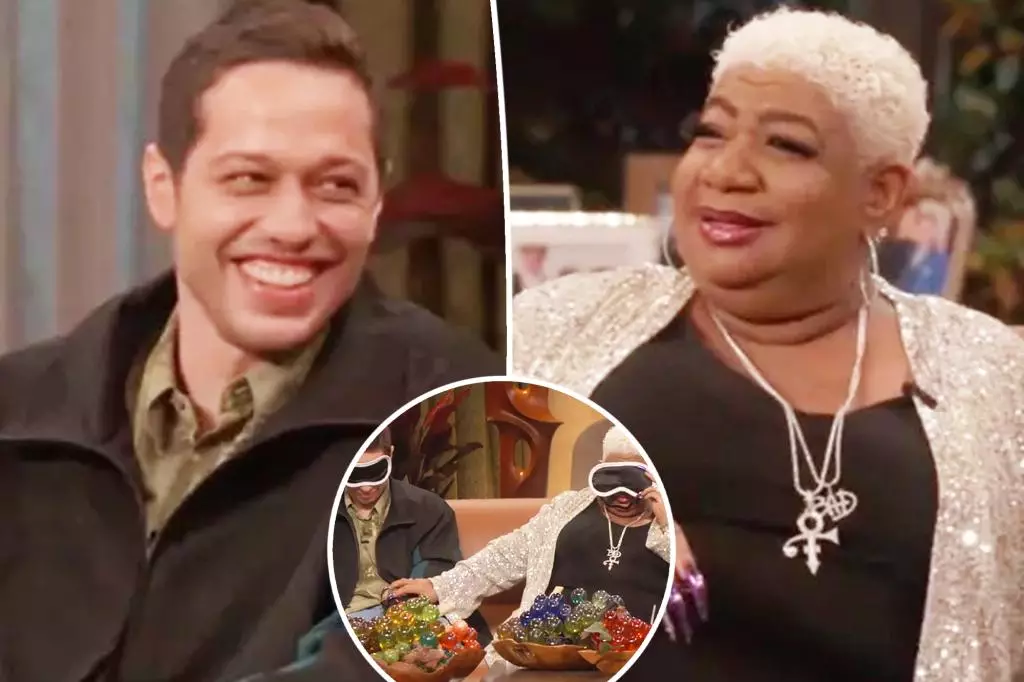In the entertainment world, particularly in comedy, the lines between playful banter and inappropriate behavior can often blur. Recently, comedian Luenell found herself at the center of a controversy following her appearance on John Mulaney’s talk show. While the affectionate nature of comedy permits playful teasing, Luenell’s actions during the live performance raised questions about boundaries and consent in a public space. As comedic figures continually push limits in pursuit of laughs, incidents like this compel us to discern where light-heartedness ends and discomfort begins.
The incident in question involved Luenell playfully tickling Pete Davidson’s leg during a blindfolded segment of the talk show. Following the backlash, she promptly extended an apology, asserting that her intentions were innocent and that she hoped Davidson would forgive her. While Luenell claimed her actions were merely “jest,” the uncomfortable atmosphere that reportedly permeated the set suggests that the audience did not share the same perception of humor.
Playful Intentions vs. Real-Life Consequences
It’s important to recognize that many comedic performances thrive on pushing boundaries— a cornerstone of humor that has seen comics like Luenell achieve acclaim. Yet, the incident with Davidson illustrates an essential caveat: comedians should be cognizant of their environment and their audience’s perceptions. People may interpret playful touching differently, especially when the recipient is seen through a lens of scrutiny, as is often the case with celebrities like Davidson.
Luenell’s representative emphasized that the intention was playful and that there was no intent to cause discomfort. This response serves as a reminder that in comedy, misinterpretations can quickly escalate into larger conversations about consent and appropriateness. The source close to Davidson reported that the atmosphere became “uncomfortable” and deemed the incident “really inappropriate,” revealing a dissonance between the intent and the impact of Luenell’s actions.
The Double Standards in Comedy
Complex societal standards often come to the forefront in celebrity interactions. Reports indicated a growing concern that Davidson, because of his celebrity status, is subject to a double standard whereby comedic liberties are taken with him in ways that may not apply to others. This sentiment hints at a cultural issue in which the pain points of famous figures become fodder for public jest. As audiences evolve, we must reflect on how our humor codes may inadvertently perpetuate a reality where individuals are seen as “fair game,” particularly those on the fringes of societal acceptance.
Such scrutiny leads us to examine how humor interacts with respect, particularly towards men like Davidson, whose public persona has often been marred by tabloid mockery and unsolicited commentary on his romantic life. While he may be a popular figure in comedy, the perception of him does not diminish his right to boundaries— an assertion that is crucial for any individual, regardless of their profile.
The Role of Apology and Future Implications
Luenell’s attempt at reconciliation with Davidson showcases a commendable recognition of the potential damage that unintended behaviors can cause. Her follow-up remark that she “wouldn’t touch him again unless he wanted” suggests her willingness to re-establish respect and boundaries in their interactions. However, the underlying issue remains—whether her humorous engagement was worth the fallout that ensued.
The aftermath of this incident undoubtedly places a spotlight on the evolving nature of comedy, especially amidst heightened discussions surrounding consent. As comedians like Luenell navigate their craft, understanding both the nuances of relationships and the sensitivities of their audience is increasingly critical. Ultimately, the evolution of comedy lies in its practitioners’ capacity to balance humor with respect, teasing with boundaries, and jest with genuine care— a reflection of the society in which they perform.
In the unfolding narrative of humor and celebrity interactions, the Luenell and Davidson incident serves as an essential case study, inviting us all to consider the responsibilities we carry when engaging with others in both public and private realms. As laughter reverberates through our lives, we must ensure that it resonates with warmth, understanding, and respect rather than interruption and unease.

